This post shows you 30 possible reasons why your home smells bad and how to get rid of the stench.
Let’s talk about something that’s not exactly pleasant but totally fixable: why your home might smells bad.
You know those moments when you walk in the door from a long trip and instead of being greeted by a fresh, clean scent, you’re hit with something less-than-appealing?
Yeah, we’ve all been there!
But the good news is, there are usually straightforward reasons behind those funky odors, and even better, there are simple ways to banish them for good.
From everyday culprits like dirty laundry and pet odors to more sneaky offenders like mold and chemical cleaners, there’s a whole range of things that can contribute to a less-than-ideal smelling home.
But fear not! I’ve got your back with 30 possible reasons why your home might smell bad, along with easy-to-implement solutions for each one.
With the solutions shared here, you can decide to tackle the source of the odor head-on or make a few tweaks to your cleaning routine.
There is no stench too stubborn that you cannot conquer.
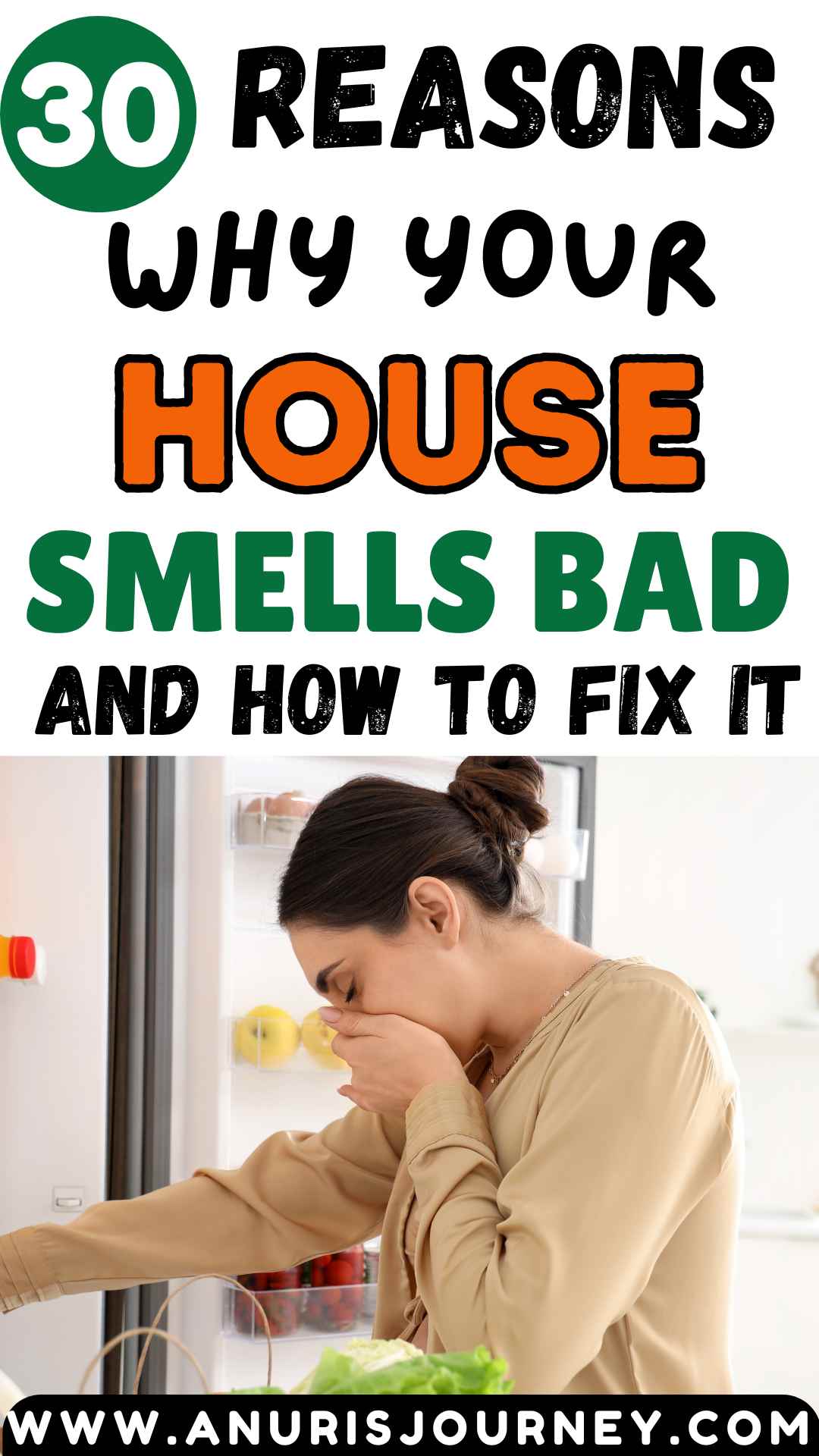
Identifying and addressing the root cause of any bad smells is essential for maintaining a fresh and pleasant-smelling home.
So, if you’re ready to bid farewell to those unpleasant smells and welcome in a breath of fresh air, let’s proceed and get your home smelling sweet again.
30 REASON WHY YOUR HOME SMELLS BAD AND HOW TO SOLVE THE STENCH
1. Lack of ventilation
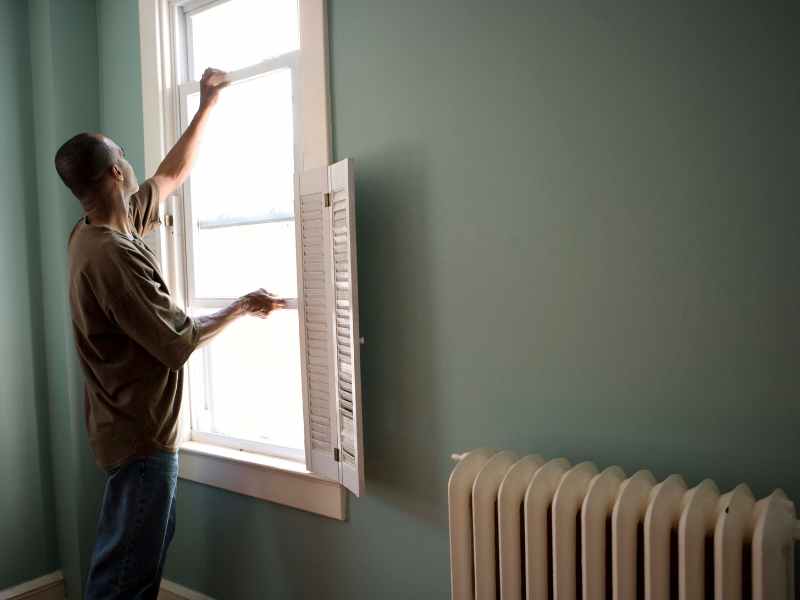 If your house feels stuffy, it’s probably lacking airflow. Without fresh air coming in and stale air going out, any odors inside just hang around, making things smell funky.
If your house feels stuffy, it’s probably lacking airflow. Without fresh air coming in and stale air going out, any odors inside just hang around, making things smell funky.
Poor airflow can trap odors inside the home.
Open windows and use fans to improve airflow. Consider installing exhaust fans in bathrooms and kitchens.
2. Dirty laundry
 Imagine leaving sweaty gym clothes in a pile for days; that smell seeps into everything nearby.
Imagine leaving sweaty gym clothes in a pile for days; that smell seeps into everything nearby.
Dirty laundry does the same, spreading its not-so-fresh scent throughout the house.
Accumulated dirty clothes can emit unpleasant odors.
Wash clothes regularly, especially sweaty or soiled items. Use laundry detergent and fabric softener to remove odors effectively.
3. Pet odors
 Love your furry friends, but they can leave behind some awful smells.
Love your furry friends, but they can leave behind some awful smells.
Without regular grooming, pet odors stick around like an unwelcome guest.
Pets, especially if not groomed regularly, can contribute to foul smells.
Bathe and groom pets regularly, clean their bedding and toys, and vacuum floors and furniture frequently to remove pet hair and dander.
4. Food waste
 Ever forgot to take out the trash and then wondered why your kitchen smells like a dumpster?
Ever forgot to take out the trash and then wondered why your kitchen smells like a dumpster?
That’s food waste for you, rotting away and releasing its stench into the air.
Leftover food or garbage not properly disposed of can cause bad odors.
Dispose of garbage promptly, seal food waste in airtight containers, and clean trash bins regularly.
5. Mold and mildew
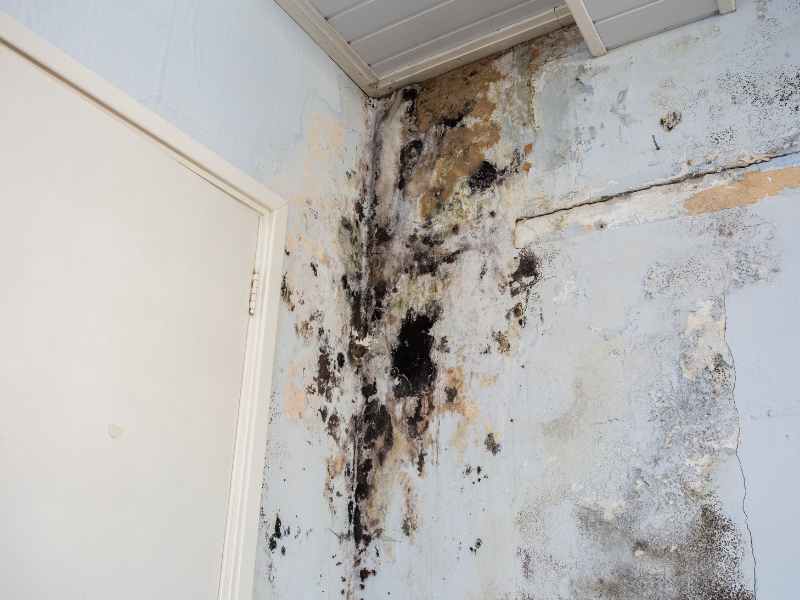 Picture a damp basement or a neglected shower curtain. Where there’s moisture, mold and mildew thrive, bringing their musty smell along for the ride.
Picture a damp basement or a neglected shower curtain. Where there’s moisture, mold and mildew thrive, bringing their musty smell along for the ride.
Damp areas can foster mold and mildew growth, leading to musty smells.
Clean and disinfect areas prone to moisture regularly, use a dehumidifier to reduce humidity levels, and fix any leaks promptly.
6. Dirty dishes
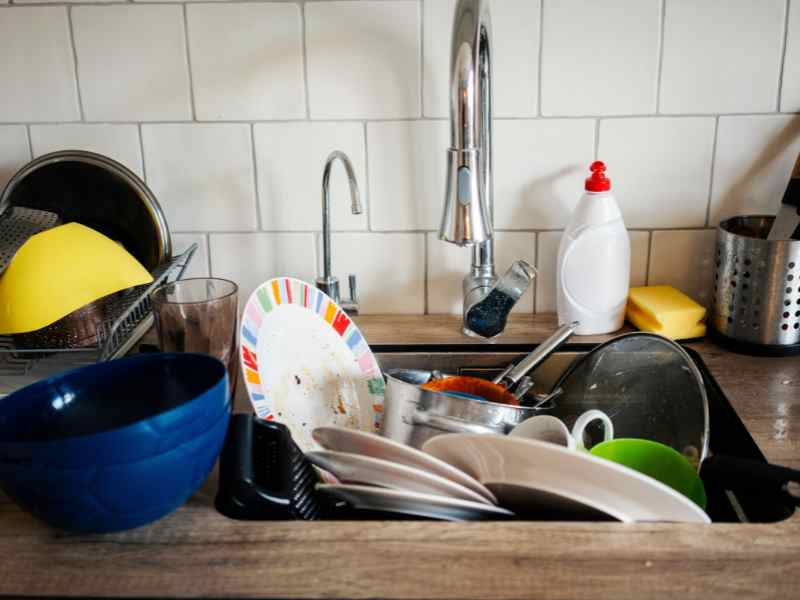 Leave dishes in the sink for too long, and you’ve got a recipe for a foul-smelling kitchen.
Leave dishes in the sink for too long, and you’ve got a recipe for a foul-smelling kitchen.
The remnants of last night’s dinner become a breeding ground for unpleasant odors.
Unwashed dishes left in the sink can produce unpleasant odors.
Wash dishes immediately after use, or load them into the dishwasher. Clean sink drains and disposal regularly.
7. Clogged drains
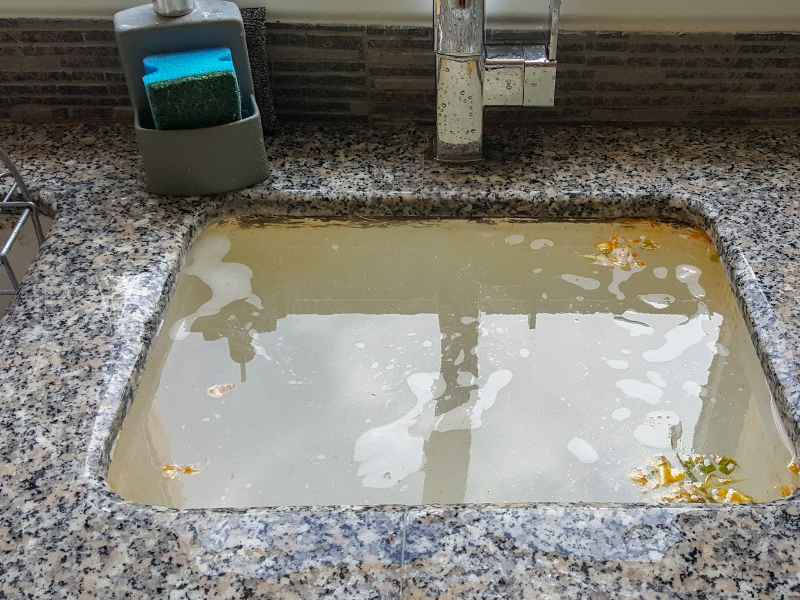 A backed-up drain isn’t just inconvenient; it’s also a breeding ground for bacteria and odor-causing gunk, turning your bathroom or kitchen into a stinky mess.
A backed-up drain isn’t just inconvenient; it’s also a breeding ground for bacteria and odor-causing gunk, turning your bathroom or kitchen into a stinky mess.
Buildup in drains can emit foul smells throughout the house.
Use drain cleaners or a plumber’s snake to unclog drains, and maintain them regularly to prevent buildup.
8. Dirty carpets
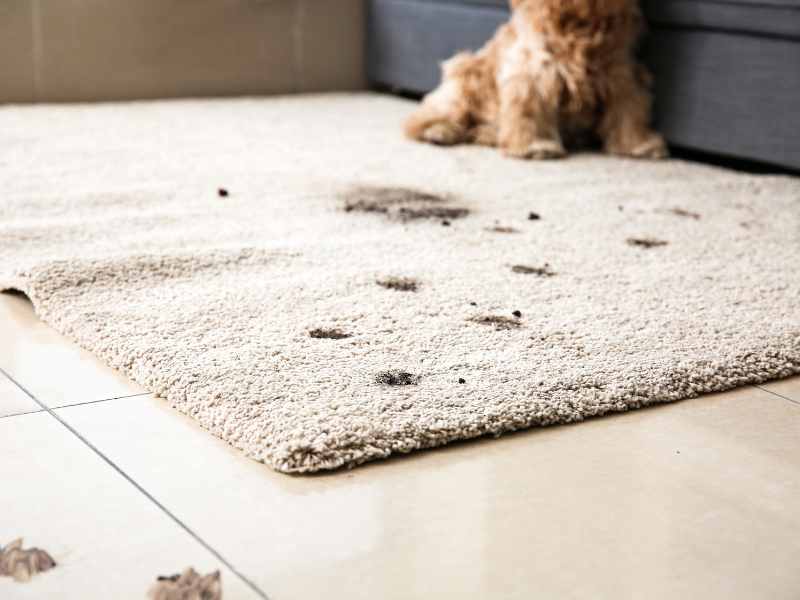 Spills, dirt, and pet accidents can all seep into your carpets, creating a lingering odor that no amount of vacuuming can fully eliminate.
Spills, dirt, and pet accidents can all seep into your carpets, creating a lingering odor that no amount of vacuuming can fully eliminate.
Accumulated dirt and spills in carpets can create odors over time.
Vacuum carpets regularly, spot clean spills promptly, and consider professional carpet cleaning if odors persist.
9. Smoke
 Whether it’s from cigarettes or cooking, smoke can cling to fabrics and surfaces, leaving behind a persistent, unpleasant smell.
Whether it’s from cigarettes or cooking, smoke can cling to fabrics and surfaces, leaving behind a persistent, unpleasant smell.
Tobacco smoke or smoke from cooking can linger and cause unpleasant smells.
Smoke outside if possible, ventilate the area well, and use air purifiers to remove smoke particles from the air.
10. Mothballs
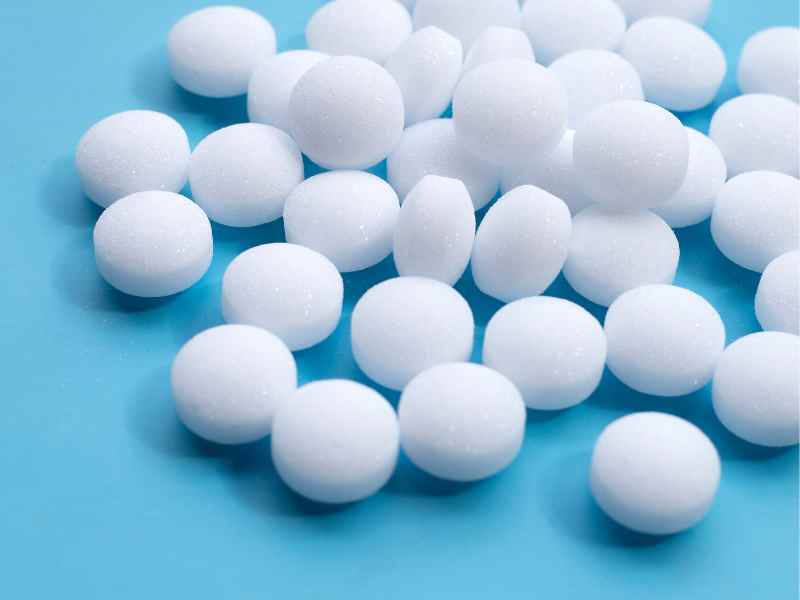 Grandma’s old trick for keeping clothes moth-free may work, but it also leaves behind a strong, lingering odor that’s not exactly pleasant.
Grandma’s old trick for keeping clothes moth-free may work, but it also leaves behind a strong, lingering odor that’s not exactly pleasant.
If used excessively, mothballs can produce a strong, unpleasant odor.
Use natural alternatives like cedar chips or lavender sachets to repel moths, and air out clothing stored with mothballs before wearing.
11. Stale air
 Ever walked into a closed-up room and immediately noticed it smelled stale?
Ever walked into a closed-up room and immediately noticed it smelled stale?
That’s because without fresh air circulating, odors linger and become more noticeable.
Lack of fresh air circulation can lead to stale, musty odors.
Open windows regularly to let fresh air in, use air purifiers or air fresheners, and consider installing a whole-house ventilation system
12. Sewer gas
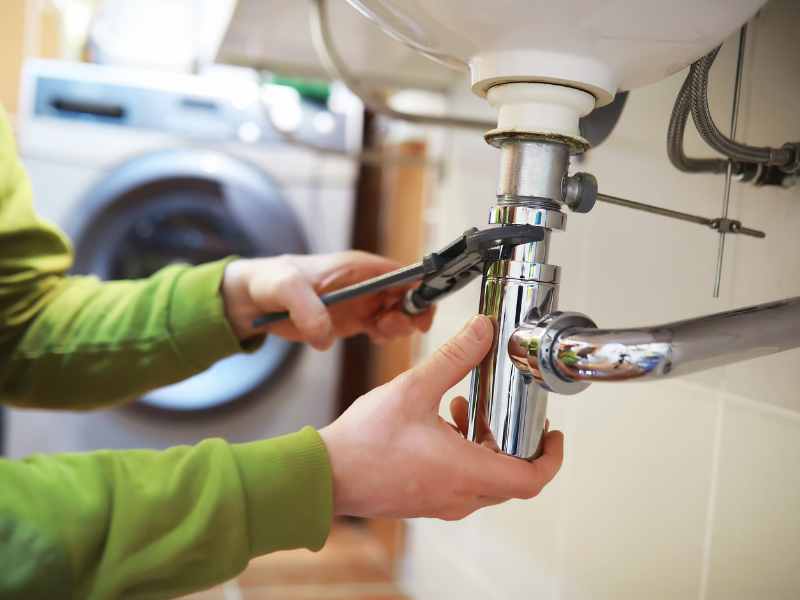 Problems with your plumbing can lead to sewer gas seeping into your home, bringing with it a distinct, unpleasant odor that’s hard to ignore.
Problems with your plumbing can lead to sewer gas seeping into your home, bringing with it a distinct, unpleasant odor that’s hard to ignore.
Issues with plumbing or sewer lines can cause foul odors to permeate the home.
Have a plumber inspect and repair any issues with plumbing or sewer lines and install traps to prevent sewer gas from entering the home.
13. Chemical cleaners
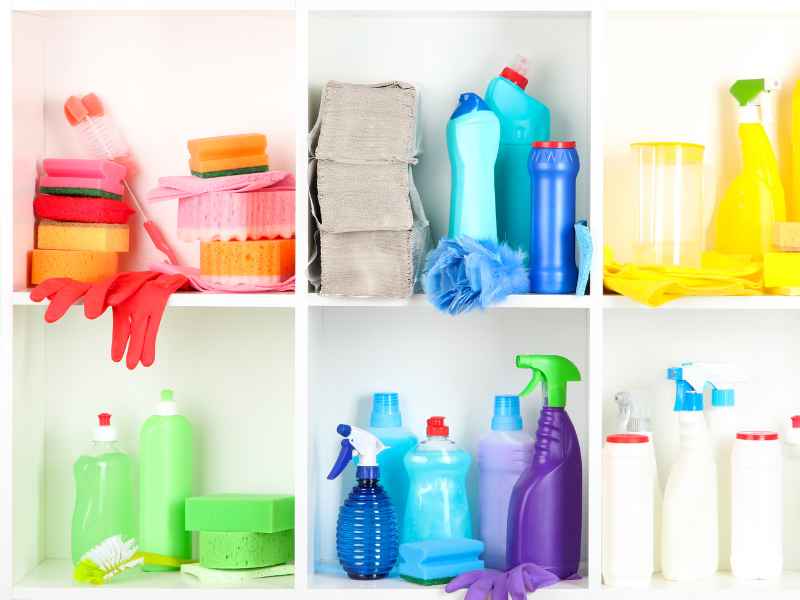 While they may make things look clean, some chemical cleaners leave behind a strong, lingering scent that’s anything but pleasant.
While they may make things look clean, some chemical cleaners leave behind a strong, lingering scent that’s anything but pleasant.
Strong chemical cleaners used without proper ventilation can leave lingering odors.
Use natural or low-odor cleaning products, ensure good ventilation when using chemical cleaners, and store them properly in sealed containers.
14. Old furniture
 That vintage couch might look cool, but if it hasn’t been cleaned in a while, it could be harboring all sorts of unpleasant odors from years past.
That vintage couch might look cool, but if it hasn’t been cleaned in a while, it could be harboring all sorts of unpleasant odors from years past.
Older furniture can retain odors, especially if not cleaned regularly.
Clean and deodorize upholstery and cushions regularly, sprinkle baking soda on fabric surfaces to absorb odors, and consider professional cleaning for stubborn smells.
15. Rotten food
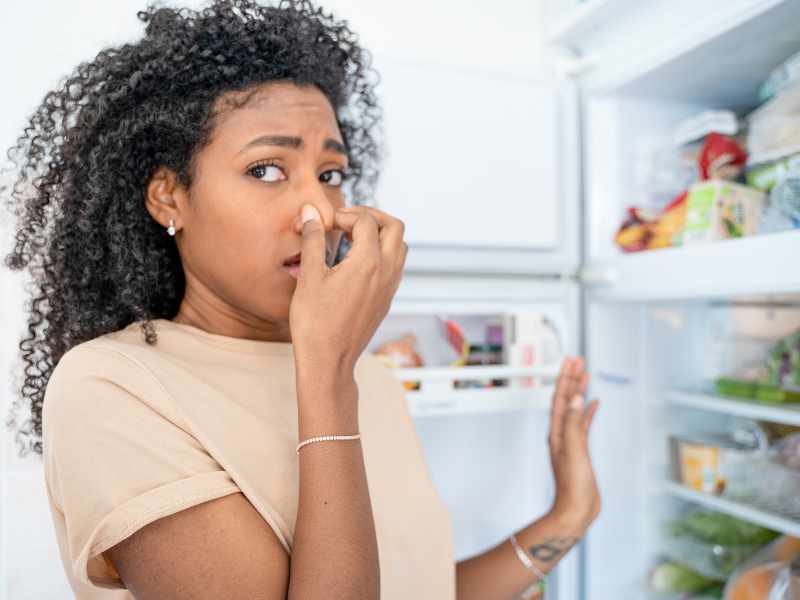 Ever opened the fridge to find something long forgotten and now rotten? That smell doesn’t just stay confined to the fridge; it can permeate the entire kitchen.
Ever opened the fridge to find something long forgotten and now rotten? That smell doesn’t just stay confined to the fridge; it can permeate the entire kitchen.
Forgotten or spoiled food in the refrigerator or pantry can emit strong odors.
Clean out the refrigerator regularly, dispose of spoiled food promptly, and use baking soda or activated charcoal to absorb odors in the fridge.
16. Humidity
High humidity levels create the perfect environment for mold, mildew, and bacteria to thrive, leading to musty, unpleasant odors throughout your home.
High humidity levels can exacerbate odors, especially in enclosed spaces.
Use dehumidifiers in damp areas, ensure good ventilation, and fix leaks promptly to prevent moisture buildup.
17. Paint or varnish
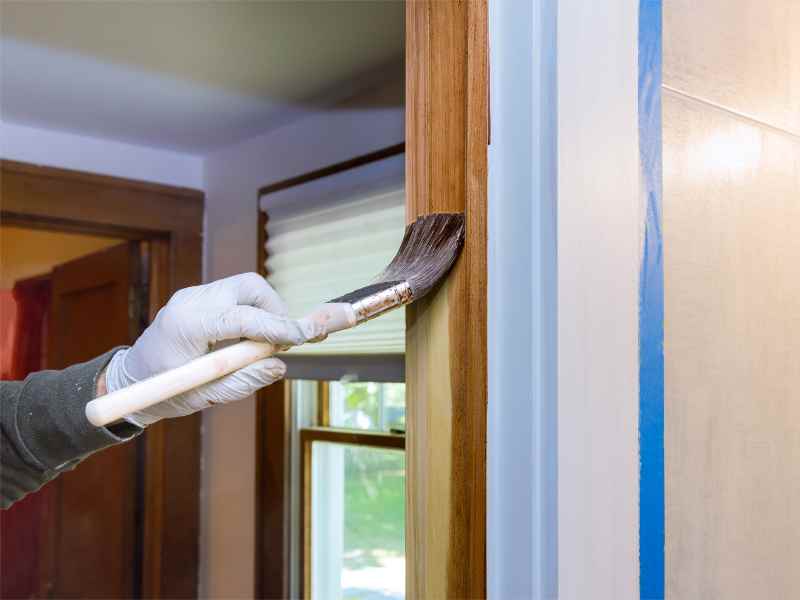 Fresh paint or varnish may look great, but until it fully cures, it can release strong, chemical odors that linger in your home.
Fresh paint or varnish may look great, but until it fully cures, it can release strong, chemical odors that linger in your home.
Choose low-VOC paints and varnishes, ventilate the area well during and after painting, and allow sufficient time for curing before re-entering the space.
18. Pests
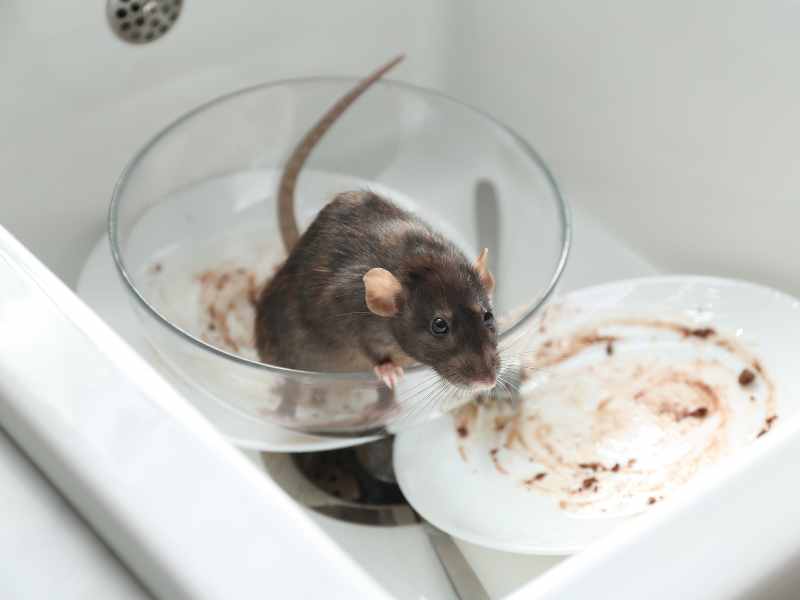 Whether it’s ants, roaches, or rodents, pests can leave behind their own distinct, unpleasant odor that’s a sure sign of an infestation.
Whether it’s ants, roaches, or rodents, pests can leave behind their own distinct, unpleasant odor that’s a sure sign of an infestation.
Infestations of insects or rodents can cause foul odors in hidden areas.
Seal entry points to prevent pests from entering, use traps or repellents as needed, and address any infestations promptly.
19. Sweat and body odor
 Letting laundry pile up or neglecting personal hygiene can lead to sweaty, smelly clothes that make your whole house stink.
Letting laundry pile up or neglecting personal hygiene can lead to sweaty, smelly clothes that make your whole house stink.
Lack of personal hygiene or sweaty clothing can contribute to bad smells.
Shower and launder clothes regularly, use antiperspirants and deodorants, and maintain good personal hygiene habits.
20. Chemical spills
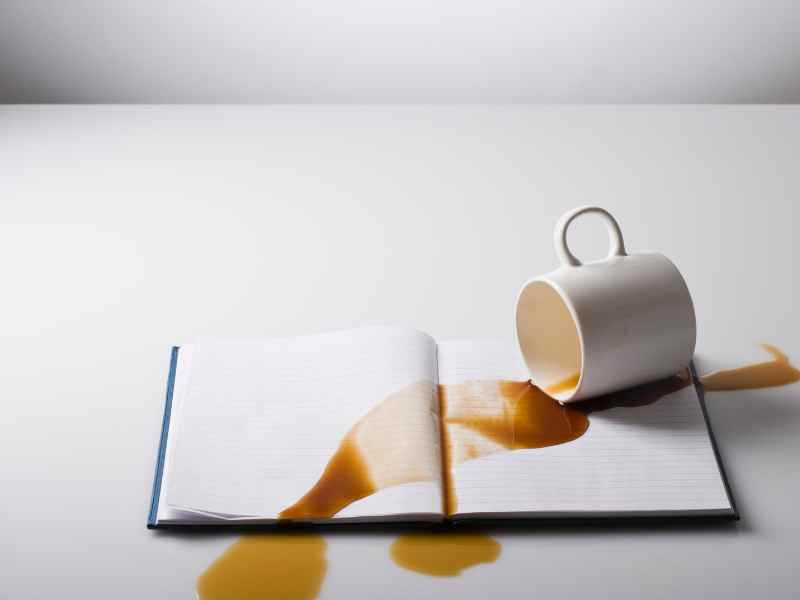 Accidentally spill bleach or another strong-smelling chemical, and you’ll be dealing with a lingering odor that’s hard to get rid of, no matter how much you clean.
Accidentally spill bleach or another strong-smelling chemical, and you’ll be dealing with a lingering odor that’s hard to get rid of, no matter how much you clean.
Clean up spills promptly with appropriate cleaning products, ventilate the area well, and dispose of chemicals safely according to local regulations.
21. Dirty or neglected bathroom
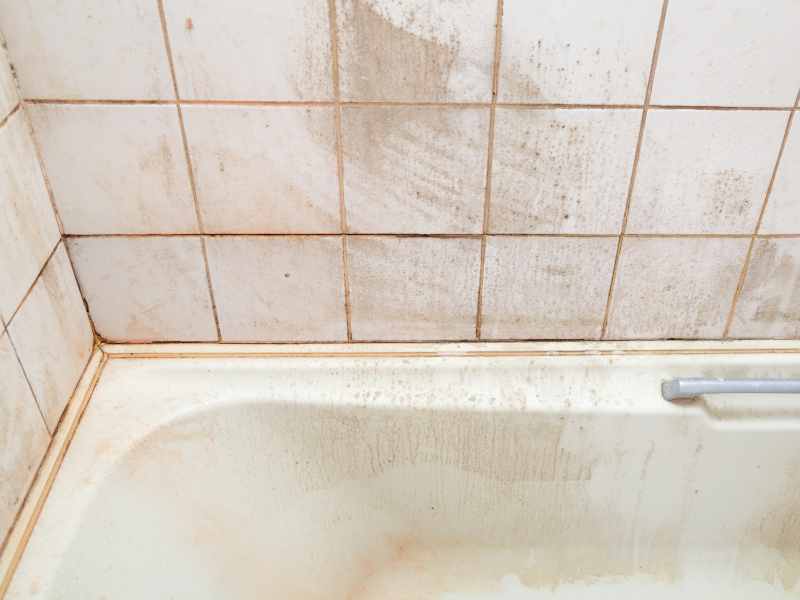 Bathrooms are breeding grounds for bacteria and mold, especially if they’re not cleaned regularly. That buildup can lead to some seriously unpleasant smells.
Bathrooms are breeding grounds for bacteria and mold, especially if they’re not cleaned regularly. That buildup can lead to some seriously unpleasant smells.
Clean bathroom surfaces regularly with disinfectant cleaners, scrub grout and tiles to remove mold and mildew, and use air fresheners or essential oil diffusers to keep the air smelling fresh.
22. Stagnant water
 Ever left a glass of water out for too long and noticed it started to smell weird?
Ever left a glass of water out for too long and noticed it started to smell weird?
That’s because stagnant water provides the perfect environment for bacteria to multiply and produce foul odors.
Empty and clean standing water sources regularly, such as pet water bowls, flower vases, and humidifier reservoirs, and fix any leaks or drips to prevent water accumulation.
23. Humidifiers and air conditioners
 These appliances can be a blessing, but if they’re not cleaned and maintained properly, they can actually make things worse by spreading mold and mildew throughout your home, resulting in bad odors.
These appliances can be a blessing, but if they’re not cleaned and maintained properly, they can actually make things worse by spreading mold and mildew throughout your home, resulting in bad odors.
Clean humidifiers and air conditioners according to manufacturer instructions, use distilled water in humidifiers to prevent mineral buildup, and replace filters regularly to maintain air quality.
24. Dirty or neglected HVAC system
Your heating and cooling system circulates air throughout your home, so if it’s dirty or hasn’t been serviced in a while, it can spread unpleasant odors along with the air.
Dust, debris, and mold buildup in heating and cooling systems can circulate unpleasant odors throughout the house.
Schedule regular professional maintenance for your HVAC system, including cleaning ducts and vents, replacing filters, and ensuring proper airflow throughout the home.
25. Paint or wallpaper
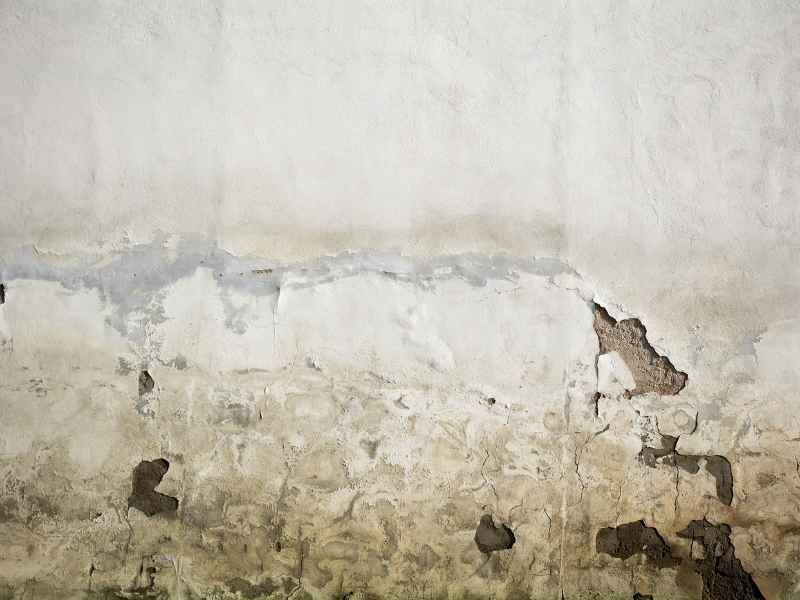 Older layers of paint or wallpaper can absorb odors over time, especially if they’ve been exposed to moisture or sunlight. That means your walls could be contributing to your home’s bad smell.
Older layers of paint or wallpaper can absorb odors over time, especially if they’ve been exposed to moisture or sunlight. That means your walls could be contributing to your home’s bad smell.
Repaint walls with low-odor or odor-sealing paints, remove old wallpaper and apply fresh adhesive before installing new wallpaper, and ensure proper ventilation during painting or wallpapering projects.
This might be one of the reasons why your home smells bad.
26. Decaying organic matter
Leaves, branches, and other organic debris can collect around your home, especially in gutters or other hard-to-reach places.
As it decomposes, it releases foul odors that can waft into your home.
Regularly clean gutters and downspouts to remove debris, trim trees and shrubs to prevent organic buildup, and dispose of yard waste promptly to prevent decomposition.
27. Household chemicals
Some cleaning products and air fresheners contain strong-smelling chemicals that can linger in the air long after you’ve used them, creating an unpleasant odor.
Opt for natural cleaning products or make your own using ingredients like vinegar, baking soda, and essential oils, and use them sparingly to minimize lingering odors.
28. Damp or wet clothing
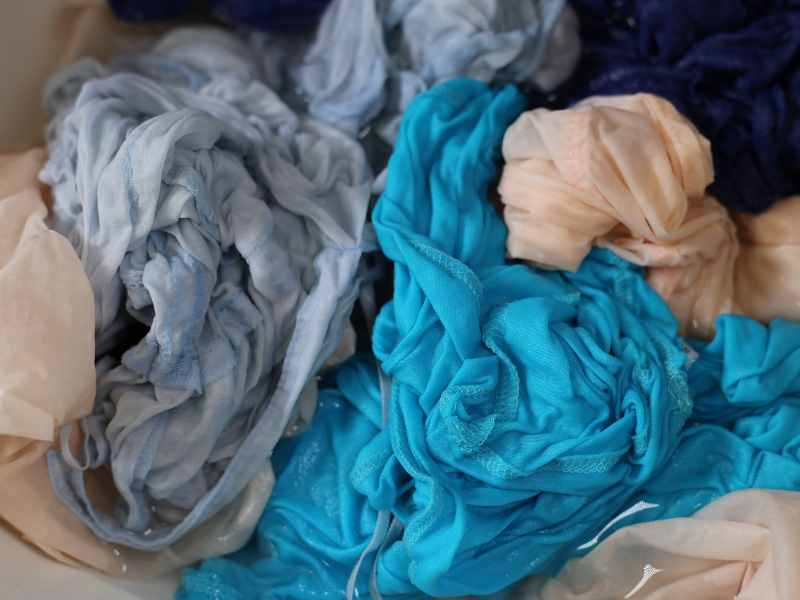 Leaving wet clothes lying around can create the perfect environment for mold and mildew to grow, leading to a musty smell that permeates your home.
Leaving wet clothes lying around can create the perfect environment for mold and mildew to grow, leading to a musty smell that permeates your home.
Hang wet clothes outside to dry whenever possible, use a clothesline or drying rack indoors with proper ventilation, and ensure laundry rooms are well-ventilated to prevent moisture buildup.
29. Poorly sealed windows and doors
Air leaks can let in outdoor odors, pollutants, and moisture, all of which can contribute to a less-than-pleasant smelling home.
Seal gaps and cracks around windows and doors with weather stripping or caulking, install storm doors or windows for additional insulation, and consider upgrading to energy-efficient windows and doors.
30. Inadequate garbage disposal
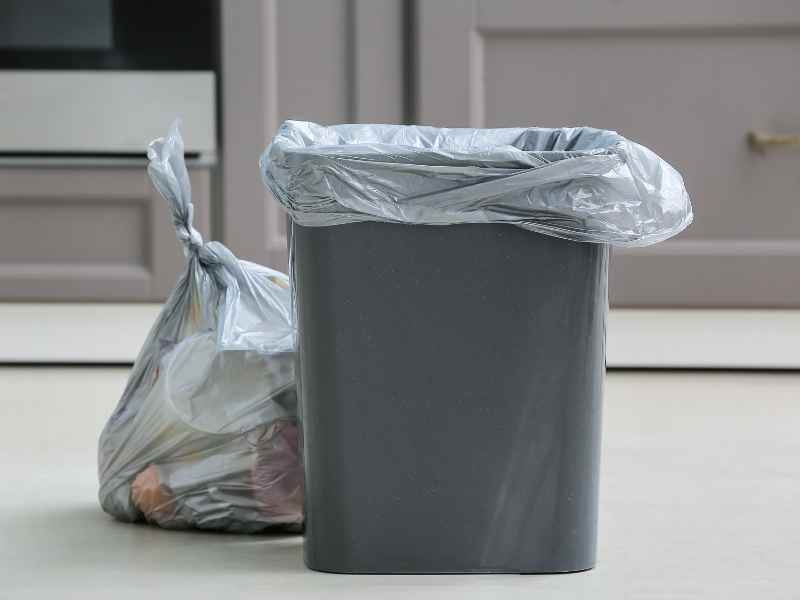 If your trash bins aren’t emptied regularly or aren’t sealed properly, they can become breeding grounds for bacteria and other odor-causing nasties, turning your home into a stinky mess.
If your trash bins aren’t emptied regularly or aren’t sealed properly, they can become breeding grounds for bacteria and other odor-causing nasties, turning your home into a stinky mess.
Overflowing or improperly sealed trash bins can release foul odors into the home environment.
Empty trash bins regularly, use liners to contain odors, and clean bins with a mixture of vinegar and water periodically to neutralize odors.
Finally,
Regular cleaning, maintenance, and proper ventilation are key to preventing and eliminating bad smells in the home.
By addressing these issues and implementing the suggested solutions, you can effectively eliminate bad odors and create a clean, fresh-smelling home environment.
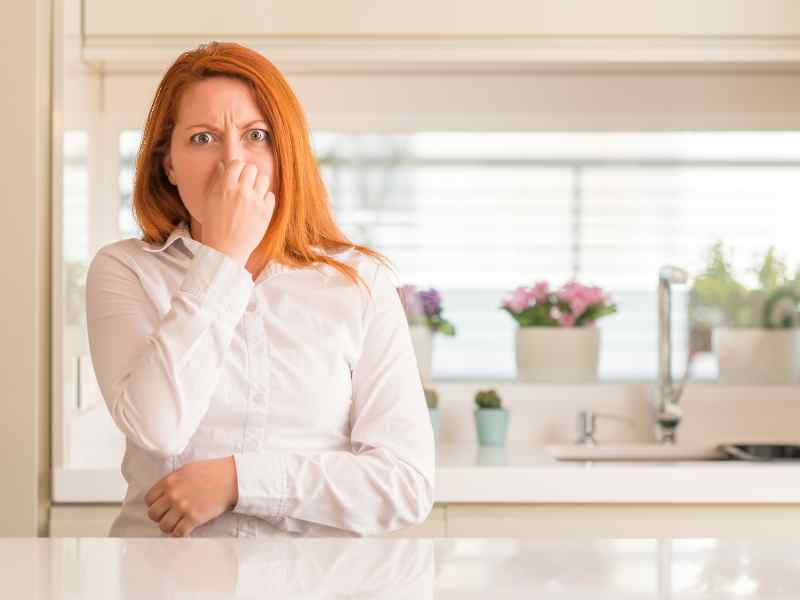
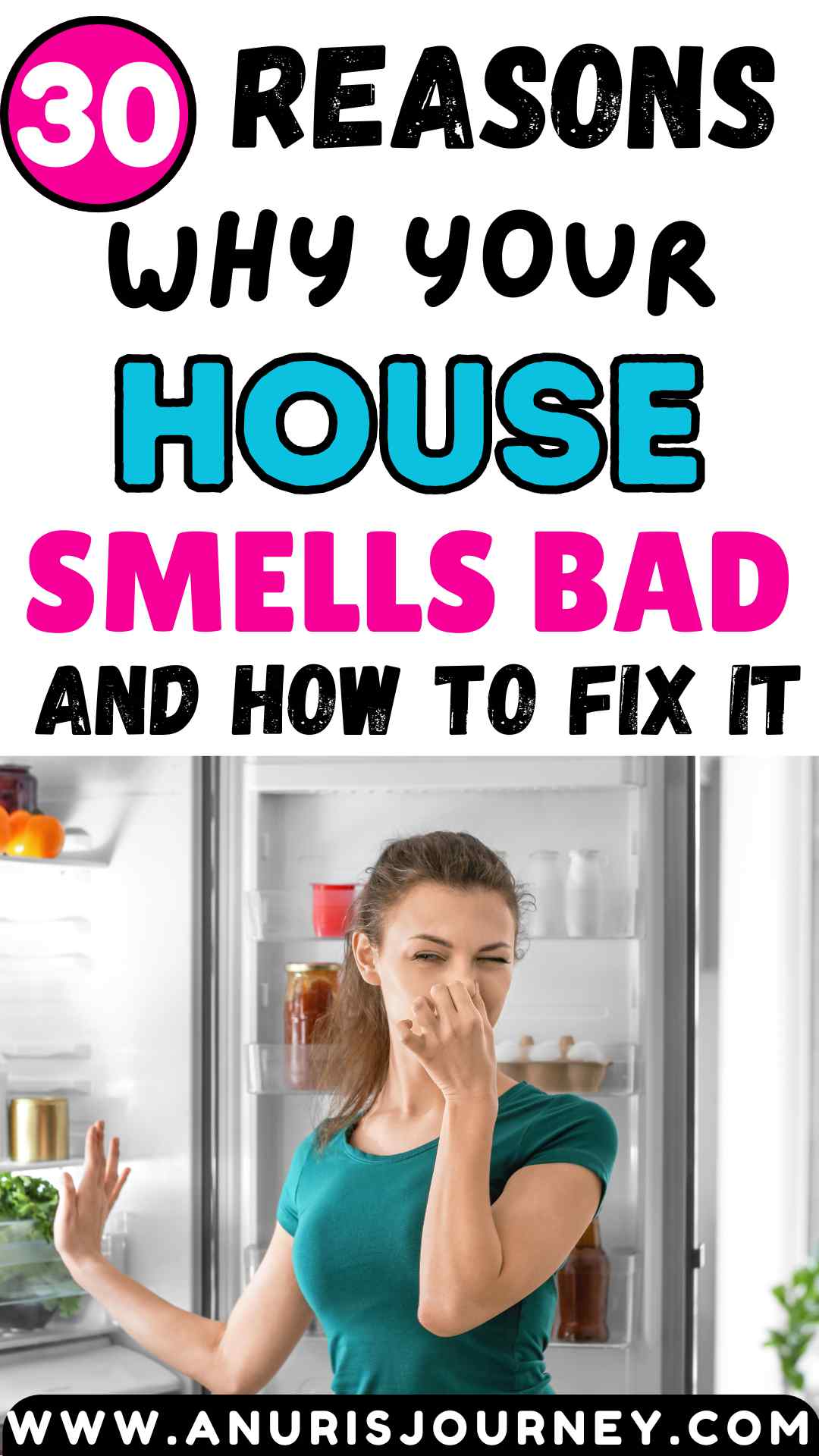 This post showed you 30 possible reasons why your home smells bad and how to tackle the origin of the odor.
This post showed you 30 possible reasons why your home smells bad and how to tackle the origin of the odor.
Leave a Reply